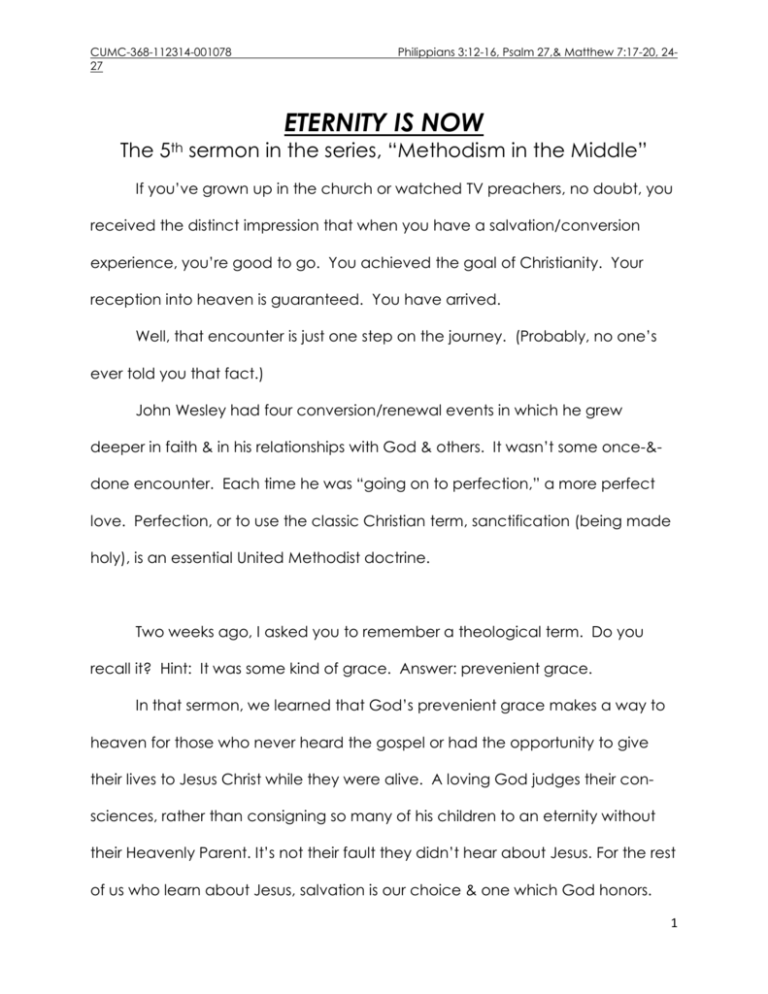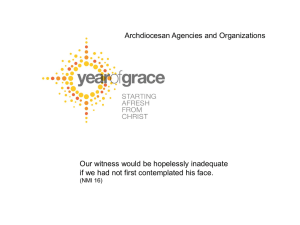
CUMC-368-112314-001078
27
Philippians 3:12-16, Psalm 27,& Matthew 7:17-20, 24-
ETERNITY IS NOW
The 5th sermon in the series, “Methodism in the Middle”
If you’ve grown up in the church or watched TV preachers, no doubt, you
received the distinct impression that when you have a salvation/conversion
experience, you’re good to go. You achieved the goal of Christianity. Your
reception into heaven is guaranteed. You have arrived.
Well, that encounter is just one step on the journey. (Probably, no one’s
ever told you that fact.)
John Wesley had four conversion/renewal events in which he grew
deeper in faith & in his relationships with God & others. It wasn’t some once-&done encounter. Each time he was “going on to perfection,” a more perfect
love. Perfection, or to use the classic Christian term, sanctification (being made
holy), is an essential United Methodist doctrine.
Two weeks ago, I asked you to remember a theological term. Do you
recall it? Hint: It was some kind of grace. Answer: prevenient grace.
In that sermon, we learned that God’s prevenient grace makes a way to
heaven for those who never heard the gospel or had the opportunity to give
their lives to Jesus Christ while they were alive. A loving God judges their consciences, rather than consigning so many of his children to an eternity without
their Heavenly Parent. It’s not their fault they didn’t hear about Jesus. For the rest
of us who learn about Jesus, salvation is our choice & one which God honors.
1
CUMC-368-112314-001078
27
Philippians 3:12-16, Psalm 27,& Matthew 7:17-20, 24-
Knowing that, in my last sermon, I left you with this question: Is it better to
know God or not? If someone can, in the end, get to heaven without hearing
the Good News & following Jesus during their life, is that better?1
Well, if there’s only heaven in the universe, the answer is “Yes.” We can
forget about Jesus in that case. The truth is: there’s more than just heaven. We
have this life right now. I mean, what do we do about it? Does God’s love
make this life, & our world, better? If we don’t believe life is better with Jesus,
then why are we here worshiping him? If we do believe it, then why are so
many of us not doing more to reflect his love & grow deeper in that love?
There are different ways to think about faith. One idea from the Old
Testament is that faith is trust in God. That’s simple.
Another idea is the Apostle Paul’s definition of faith in his Letter to the
Romans. For him, faith is a foundational, bedrock belief in Christ & the
Resurrection. If you say you’re a Christian, then you will act like one & act with
faith. There’s no middle ground. There’s not a little faith or a lot of faith. There’s
just faith. Either you have it or you don’t, according to St. Paul.
John Wesley adds a third (faith) definition. --- Acknowledging that God is
love (1st John 4:16), our response to that love is faith in Christ.2 We cannot love as
1
Let’s not idly assume that persons who don’t know God hold any faster/firmer to their consciences than
persons who do know God. Many persons knowingly do not follow the proper dictates of their own
conscience – believer or not! Let’s not romanticize primitive humanity. All humans have the same
propensity toward good & evil – primal or civilized.
2
John Wesley in Sermon #31, “The Law Established Through Faith.”
2
CUMC-368-112314-001078
27
Philippians 3:12-16, Psalm 27,& Matthew 7:17-20, 24-
completely as God does, but we can imitate & approximate the perfect love of
God. When we strive for that perfect love with the help of the Holy Spirit, that’s
faith. Stated another way: since the life of God is one of love, then the life of
the Christian is one of faith that draws ever nearer to that love. God has love.
We have faith that embraces & moves toward God’s love.
The God whose prevenient grace welcomes non-believers into the next
life is the same God whose sanctifying grace makes it possible for believers – you
& me -- to grow in love in this life. Eternity is not just a haven on the other side of
death. Eternity is now. We enact God’s love today. We don’t wait for heaven.
So, the question is not, “Is it better to know God in this life”? The question is, “Is it
better to know God’s love in this life?”
Someone can argue that life without God is better, but since God is love,
as the scriptures teach, then we’re really saying that life without love is better.
Do we believe that statement? In fact, don’t we really want more love – more
love for ourselves, more love for others, more love in our world?
Even the critics of Christianity would not be so critical of us, if we were
more loving. When they point out our hypocrisy, they’re telling us that we’re not
loving enough. Gandhi famously said: “I like your Christ. I do not like your
Christians. Your Christians are so unlike your Christ.” Point taken! We take his
name, but often bear little family resemblance to our brother, Jesus.
Indeed, some of his followers – you & I - have gotten it wrong many days,
fouled up a good thing, & committed some terrible acts in Jesus’ name. Those
3
CUMC-368-112314-001078
27
Philippians 3:12-16, Psalm 27,& Matthew 7:17-20, 24-
mistakes, though, are no reflection on him. He never did such things. I could
commit some sin or atrocity in your name, too, but is that a reflection of you or
of my own misguided behavior? You cannot blame Jesus for our mistakes. The
burden of that sin is on us. The only assurance & hope we have to be better &
make things better is through Jesus & the supreme love & grace of God.
Consider the good which that love has brought over the centuries. --Christians created hospitals. We are the ones going into Ebola’s “hot zones.”
Every infected healthcare worker from Africa brought to our shores for treatment
has been a medical missionary. The one who died last week, Dr. Martin Silia,
served at a UM hospital in Sierra Leone. Christians, though, are regularly at work
to relieve suffering in all kinds of disaster areas & long after the government help
leaves – Hurricane Katrina, the Haitian earthquake, & Super-storm Sandy. Some
of you have done that relief work in Mississippi, Haiti, & Maryland.
Christians created orphanages, inner city missions, the Salvation Army.
The International Red Cross has Christian origins. Christians were the ones who,
centuries ago, championed the causes of women & children & education. The
abolition of slavery was a Christian enterprise & we are still the ones leading the
efforts against human trafficking today. The Civil Rights movement in the U.S.
was led by the Rev. Dr. Martin Luther King, Jr. & other Christian leaders. Even
something as seemingly secular as the volunteer fire service began with Jesus’
dictum to “Love thy neighbor.” Their symbol is a maltese cross/cross pate.
Communist nations do not have volunteer fire companies. Suzan Neiger-Gould,
4
CUMC-368-112314-001078
27
Philippians 3:12-16, Psalm 27,& Matthew 7:17-20, 24-
the executive director of Manna on Main Street has publicly stated that efforts
to care for the needy in this area would not exist without the faith community.
I mean, it’s not a coincidence that so many voluntary organizations whose goal
is helping others began in nations where Jesus was known.
I believe that Jesus & his way make for a better life – right now. It’s not just
a heaven thing. (Are you sharing that love to make this world better or have
you been silent & inactive, keeping that love to yourself?)
As I remind us of these blessings, I wonder how Christians can be so good,
especially when we’ve demonstrated that we’re not inherently good. How
does goodness happen? It’s because we’re not good on our own, but by the
power of God’s love. To God be the glory! You see, true faith/religion is an
inward principle. It’s the mind that is in Christ; or, in other words, the renewal of
the soul after the image of God, in righteousness and true holiness. This can
never be wrought in us by ourselves, but by the power of the Holy Spirit.3
To bring some of this together. --- Prevenient grace brings us to God (what
God does to us). Justifying/saving grace saves us for God (what Christ does for
us). Sanctifying grace grows us ever closer to God’s love & the love of others
(what the Holy Ghost does in us).
God even provides the means of grace for us to grow in love toward
perfection. We are to use those spiritual disciplines. What are they? Searching
3
John Wesley in Thoughts Upon Methodism.
5
CUMC-368-112314-001078
27
Philippians 3:12-16, Psalm 27,& Matthew 7:17-20, 24-
the scriptures, prayer & fasting, conferring with other Christians, engaging
worship & the sacraments. If we’re bored & not growing in grace & not acting
with love & not going on to perfection, it is because we fail to use these means.
I often lament how many Christians ponder, “Is getting saved (getting
right with God) all there is to this religion?” They wonder if there’s more to life &
faith. They are more often discouraged, than alive in Christ. It’s because
they/we are not employing God’s sanctifying grace which blesses us daily.4 A
faith that is not vital is not faith. It’s religion (religious principles/tenets). It’s rules.
It’s ritual. We come to rely on ourselves & our own goodness, which too often
fail us. It’s more than just the day we were saved. Like the old hymn, it’s “living
for Jesus” every day.
Some of you may be asking yourselves: “Why didn’t I know this? Why have
we gotten so far off track?”
Because when we think salvation is a once-&-done encounter, we don’t
think there’s anything left to be & do. When we have that single conversion
experience & its effects begin to wane, we don’t realize that God’s sanctifying
grace makes renewal possible. The true disciple can die to self & sin, & rise
anew to Christ each day.
Prevenient grace is involuntary in that it happens to us. Justifying grace is both involuntary & voluntary:
God makes salvation possible without our effort, yet we have to make the effort by choosing to accept
Christ’s grace-filled effort. Sanctifying grace is what we must do; it’s with Spirit’s help, but we must do it. As
the Apostle Paul writes, “Work out your own salvation”( Philippians 2:12). Since we have to do it, we don’t.
4
6
CUMC-368-112314-001078
27
Philippians 3:12-16, Psalm 27,& Matthew 7:17-20, 24-
Again, many of us have this magical belief that once saved, that’s it.
We’re made right with God, so all’s right with the world & our relationship to it. I
can now get to heaven, so that’s it. Such belief is only part of the story, yet it’s
so rampant because too many church folk are concerned more about quantity, than quality, more about statistics, than lives changed by Jesus Christ & lived
for him every day. If we had as many people truly living for Jesus as they are
hand-wringing about the numbers, the numbers would take care of themselves!
John Wesley’s greatest fear was this: “I am not afraid that the people
called Methodists should ever cease to exist…. But I am afraid, lest they should
only exist as a dead sect, having the form of religion without the power. And this
undoubtedly will be the case, unless they hold fast the doctrine, spirit, and
discipline with which they first set out.”5
We take the name Christian when we’re saved, but do not strive to live
like Christ. Jesus, himself, said, “Not everyone who calls me ‘Lord’ will enter the
kingdom of heaven, but only the one who does the will of my Father in heaven”
(Matt. 7:21).
Despite his warning, we still count how many persons gave their lives
to Christ or were baptized or are on the membership rolls, rather than how many
are studying their Bible, serving the needy, witnessing to their faith, earnestly
participating in a small group, praying & fasting, engaging worship & the sacraments, & have the “fruits” of faith, as Jesus taught in the Sermon on the Mount.
5
Ibid.
7
CUMC-368-112314-001078
27
Philippians 3:12-16, Psalm 27,& Matthew 7:17-20, 24-
Ironically, the same persons who rue the membership numbers are the same
ones who are unwilling to count the hours we serve others in Jesus’ name!
“Every good tree bears good fruit…. A good tree cannot bear bad fruit.
Thus, you will know them by their fruits,” preached Jesus. Or, as Karen Weiss
quoted from James last week, “Faith by itself, if it has no works, is dead” (James
2:17). And,
“let us love, not in word or speech, but in truth & action” (I Jn. 3:18.)
The fact is that knowing God -- believing in God & God’s love -- is the
better way to live. A truly loving God could only make this earthly life better.
Eternity is now. It doesn’t wait for death. “I believe that I shall see the goodness
of the Lord in the land of the living,” the psalmist writes.
This is why we tell others about Jesus’ love now. (Do we?) This is why we
make sacrifices to be in worship every week. (Do we?) This is why we
sacrificially give 10% of our income. (Do we?) This is why we serve the needy.
(Do we?) This is why we make it a point to read & study the Bible. (Do we?) This
is why we live: because we believe that the best life is the one made possible by
Jesus Christ now. We believe the overwhelming grace of God does to us, for us,
& in us what we cannot. It’s “Not that we have … already reached the goal (of
being made perfect); but we press on to make it our own (goal), because Christ
Jesus has made us his own.”
In the Name….
Copyright 2014 by G.D.Knerr at Lansdale, Pa. All rights reserved.
8







